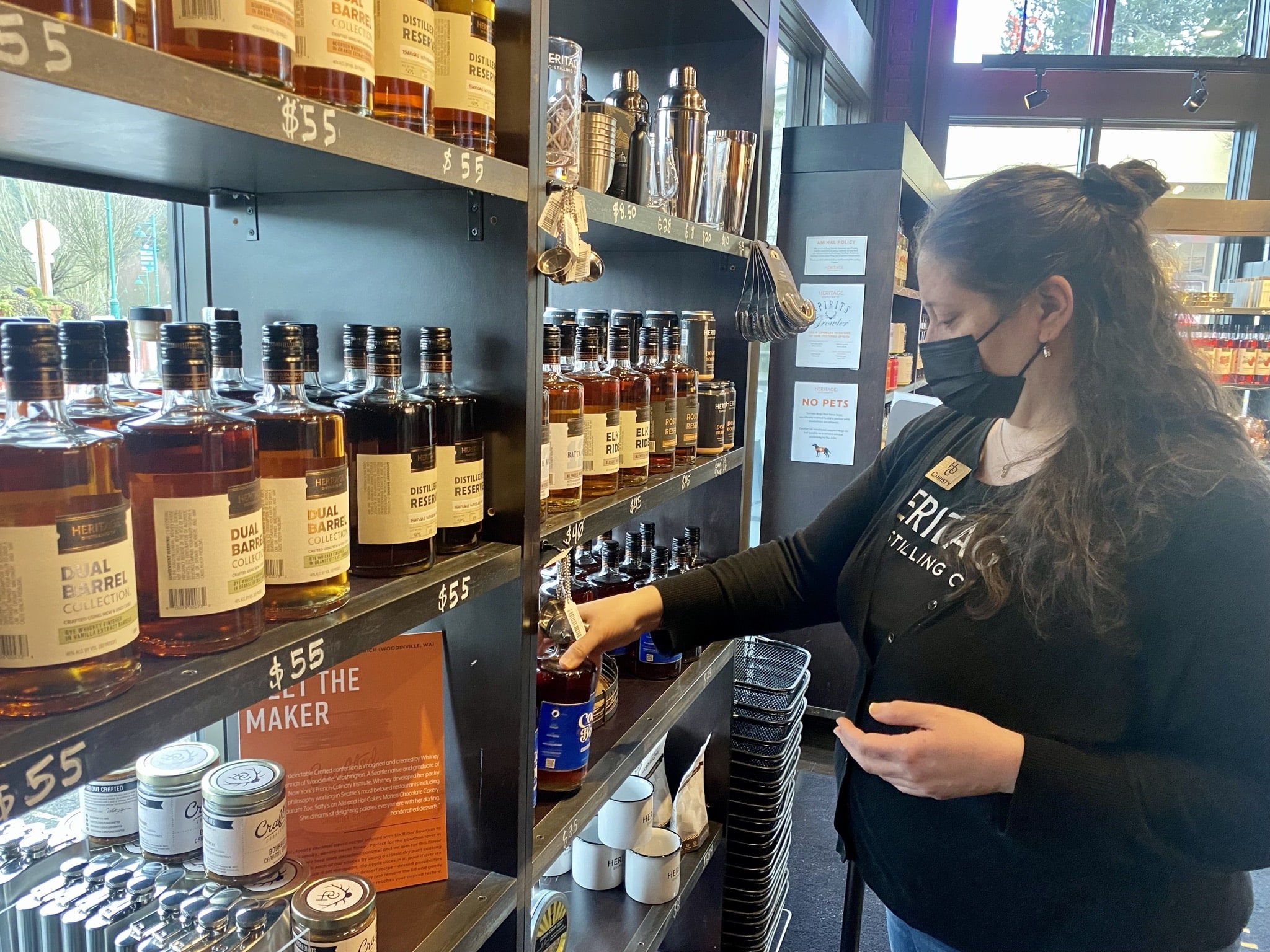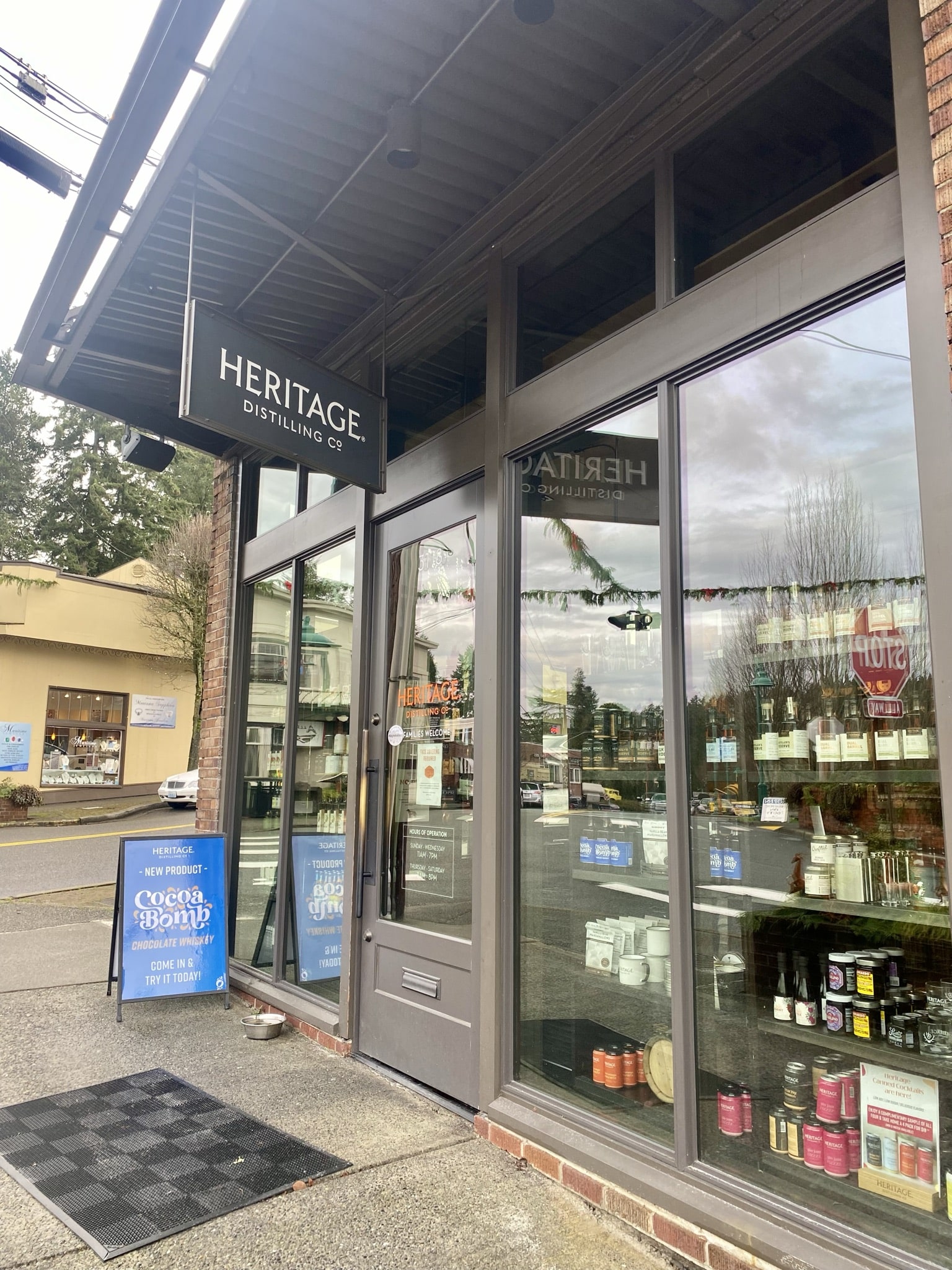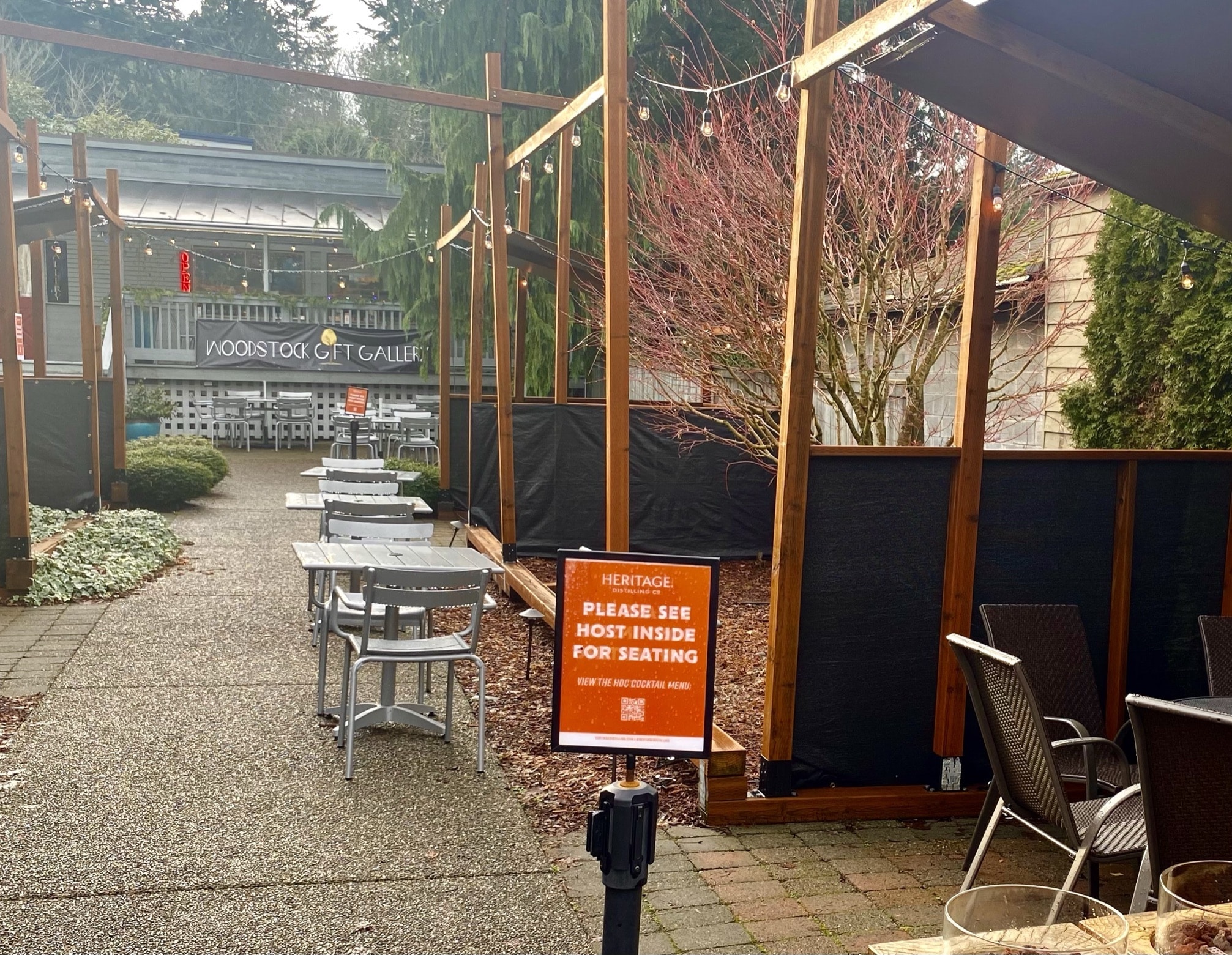Business Government
State’s COVID test distribution portal not for businesses
The first two weeks of 2022 have been rough for local businesses — even by 2021 standards — what with the double whammy of snow and icy roads plus staff shortages related to the omicron surge.
The impact on operations and loss of revenue has hit all sectors — retail, hospitality, professional services — “just about every area,” said Miriam Battson, president and CEO of the Gig Harbor Chamber of Commerce.
Federal and state health officials have encouraged the use of self-administered rapid antigen tests to help curb the spread of the highly contagious omicron variant. And at least one Gig Harbor business, Heritage Distilling Company, has used the tests with good success, according to CEO and co-founder Justin Stiefel.

Employee Christy Carr arranges a display of spirits at Heritage Distilling Co.’s tasting room in Gig Harbor. Christina T Henry / Gig Harbor Now
Last week, Gov. Jay Inslee unveiled a plan to distribute 5.5 million at-home COVID-19 tests, 3.5 million of which are slated for distribution through an online portal where individuals and families can order them directly to their home at no charge. The state Department of Health is coordinating with Amazon and CareEvolution, which developed the test distribution platform, to operate the portal, which is expected to open in mid-January. That’s not going to help business owners like Stiefel, at least not directly.
“Businesses will not be part of the distribution plan from DOH,” said health department spokesman Frank Ameduri.
The volume of tests needed for businesses would be prohibitive based on the available supply at this time, Ameduri said. But that’s not the only reason.
“The state Department of Public Health supports the public health for individual people living in Washington. Private businesses are responsible to support and protect their workers,” Ameduri said. “There certainly are not enough testing supplies available now for state or local health departments to provide tests to private businesses, but it’s also not part of DOH’s mission to do that.”

Heritage Distilling Co.’s tasting room in Gig Harbor. The company has aggressive mitigation policies to prevent the spread of COVID-19, which has helped it weather the omicron surge in cases, according to CEO and co-founder Justin Stiefel. Christina T Henry / Gig Harbor Now
Stiefel thinks that’s short-sighted.
Since the start of the pandemic, Heritage Distilling, a craft distillery with tasting rooms in Gig Harbor, Roslyn, Seattle, Tumwater and two in Eugene, Ore., has maintained operations to some degree. Early on, the company turned to making hand sanitizer with raw materials and was deemed an essential service.
As the pandemic progressed, Heritage took an aggressive mitigation approach, brought in a consulting firm to review its operations and hired a COVID compliance officer. It has held vaccine clinics at its locations and disseminated information on vaccines, but hasn’t required vaccination for its employees. Heritage Distilling currently has a nearly 96% vaccination rate among its 140 employees, and not because of any pending mandate from state or federal governments.
“We’ve been focused very much on giving them the information that they need to make the best medical decisions and then we always encourage them to ‘talk with your doctor, your healthcare provider,’” Stiefel said.
More recently, the company began buying rapid tests, wherever it could find them, to deploy as part of its protocol, making them available to employees at all locations.

Customer Anthony Chelf enjoys a beverage at Heritage Distilling Co.’s tasting room in Gig Harbor. Christina T Henry / Gig Harbor Now
“We put the protocol in place that if you feel any kind of symptom, come get a test, check it out, take it home, take the test,” Stiefel said. “That’s worked very well for us. … We had a brief closing of our Eugene tasting room last year for a few days due to COVID, but production stayed operational.”
The percentage of employees testing positive has been low.
“It’s been a very few number of our employees who have tested positive historically,” Stiefel said.
The company was able to source supplies for optimal prices.
“We bought 200 (tests) in November, and another 100 in December. They were running anywhere online between $24 to $29 plus shipping each,” he said. “We just put another order in for 200 more this week … They’re down below $10 in bulk through some medical agencies, so it’s still going to be a couple thousand dollars.”
The company has also reimbursed employees on occasion for tests they have purchased.
Businesses in Washington have received considerable help from federal and state COVID recovery resources. Stiefel said his company benefitted from the federal Small Business Administration Paycheck Protection Program, which offered forgivable loans to companies to keep employees on the payroll.
Assistance has also filtered down through local health agencies. Tacoma-Pierce County Health Department has a form for businesses and organizations to order tests.
“Test kits are distributed by priority to schools, outbreak sites and congregate settings first, but we have supported 125 businesses with 25,774 test kits,” said Kenny Via, spokesman for TPCHD.

Outdoor seating remains available at Heritage Distilling Co.’s tasting room in Gig Harbor. Christina T Henry / Gig Harbor Now
Nonetheless, Stiefel thinks the state’s efforts to distribute tests — which are in addition to federal test distribution, according to Inslee — could be streamlined by including businesses.
“The government (federal and state) should be partnering with businesses to get these in bulk to businesses, nonprofit employers and public-sector employers (cities, counties, states, school districts, etc.),” Stiefel said. “The government knows with some degree of certainty how many employees each business has. It would be very fast and much more efficient to get these in bulk to businesses, nonprofits, etc.”
Under the plan Inslee shared last week, schools will receive 1 million of the 5.5 million tests. The remainder will go to local health organizations to reach vulnerable populations such as those in long-term-care facilities and homeless shelters, as well as others who lack access through the online portal.
Battson, speaking in general the day after Inslee’s test distribution announcement (Jan. 5), said the recent scarcity of tests has impacted chamber members.
She had this to say about the moral of Gig Harbor businesses, “At this point, I think everyone is just used to rolling with it and waking up to see what the new rules are today.”
The Tacoma-Pierce County Health Department operates testing sites that have been offering PCR tests (which detect the genetic material of SARS-CoV-2, the virus that causes COVID-19, with results in three to five days).
“We’ve often heard of results within 24 to 48 hours, but the laboratories cannot guarantee that shorter time frame,” Via said.
TPCHD is looking to add rapid antigen tests to those sites soon.

Employee Christy Carr offers samples to a customer at Heritage Distilling Co.’s tasting room in Gig Harbor. Christina T Henry / Gig Harbor Now
Get tested if you have symptoms or if you have been exposed to COVID-19, TPCHD recommends. If you are symptomatic, get tested immediately. If you’re a close contact of someone with COVID-19, get tested at least five days after you last had contact.
Under current (Dec. 27, 2021) CDC and DOH guidelines:
• People who test positive for COVID-19 should isolate for five days even if they are asymptomatic (without fever for 24 hours), followed by wearing a mask for five days. If you have a fever, stay home until your fever resolves.
• People exposed to COVID-19 who are unvaccinated or have not received the full set of vaccines plus booster should stay home for five days and wear a mask for five additional days. Test on Day 5 if possible. If you develop symptoms, get tested and stay home.
• People exposed to COVID-19 who are fully vaccinated and boosted should wear a mask for 10 days around others. Test on Day 5 if possible. If you develop symptoms, get tested and stay home.

